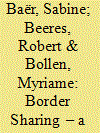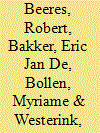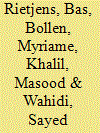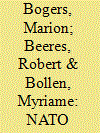|
|
|
Sort Order |
|
|
|
Items / Page
|
|
|
|
|
|
|
| Srl | Item |
| 1 |
ID:
182546


|
|
|
|
|
| Summary/Abstract |
From 2011, due to war, conflict, and ensuing unrest, both in the Middle East and Africa, the European Union’s southern external borders were confronted with an influx of migrants and refugees. At its height, the influx became known as a migration (or refugee) crisis and the European Border and Coast Guard Agency (FRONTEX) was perceived as a pivotal partner in crisis management at the borders. FRONTEX does not avail of its own operators nor materiel, and, consequently, Schengen member states and Schengen Associated Countries were requested to contribute personnel and equipment for operations. From 2012 to 2018, this article analyzes the member states’ burden-sharing behavior regarding their contributions to European Border Guard Teams and Technical Equipment Pool. Our findings include both over- and under-contributors. As the sum total of contributions over all member states is high, it could be concluded, member states derive common benefits from border management. However, results also show that, as compared to others, member states situated at the European Union’s Southern and Eastern borders, on average, are over-contributing. Moreover, contributions from individual member states fluctuate over time. Apparently, the acquired benefits are not always perceived in the same way.
|
|
|
|
|
|
|
|
|
|
|
|
|
|
|
|
| 2 |
ID:
113330


|
|
|
|
|
| Publication |
2012.
|
| Summary/Abstract |
This article examines the pattern of expenditures for national security of the Netherlands from 1990 until 2009. In 1990, military spending amounted to 2.7% of Gross Domestic Product (GDP). In 2009, almost two decades later, this ratio dropped by more than a full percent. During this period, the reduction of funds available for national security was in concurrence with the Dutch government's spending policies. The Netherlands Armed Forces (NAF) changed dramatically in terms of capabilities, size, equipment and personnel in this two-decade time span. Our investigative results indicate that in spite of this transition, no significant changes have been implemented since 1990 in how the Dutch defence budget is allocated for the Navy, Army and Air Force. Furthermore, the mix of expenditures for salaries, operations and maintenance, as well as those for capital investment, stayed roughly the same for the duration of the period studied.
|
|
|
|
|
|
|
|
|
|
|
|
|
|
|
|
| 3 |
ID:
088700


|
|
|
| 4 |
ID:
185490


|
|
|
|
|
| Summary/Abstract |
This paper provides both a quantitative and a qualitative review and interpretation of 153 journal papers on NATO burden sharing behaviour published over the period 1966–2020. Based on our findings, we distinguish three paradigms, reflecting the main questions and views within their particular realm of burden sharing research. Subsequently, these three paradigms study (1) the distribution of defence burdens amongst NATO member states; (2) the determinants of NATO burden sharing behaviour; and (3) how contributions to the public good of individual member states merge to determine the overall level of the good available for consumption. For each paradigm, a qualitative insight in evolving bodies of literature is offered. As it turns out, most burden sharing studies are limited to one paradigm and its ensuing main question. Future research may benefit from cross-fertilization across paradigms, longitudinal approaches and a widening of empirical foci to encompass novel threats.
|
|
|
|
|
|
|
|
|
|
|
|
|
|
|
|
|
|
|
|
|